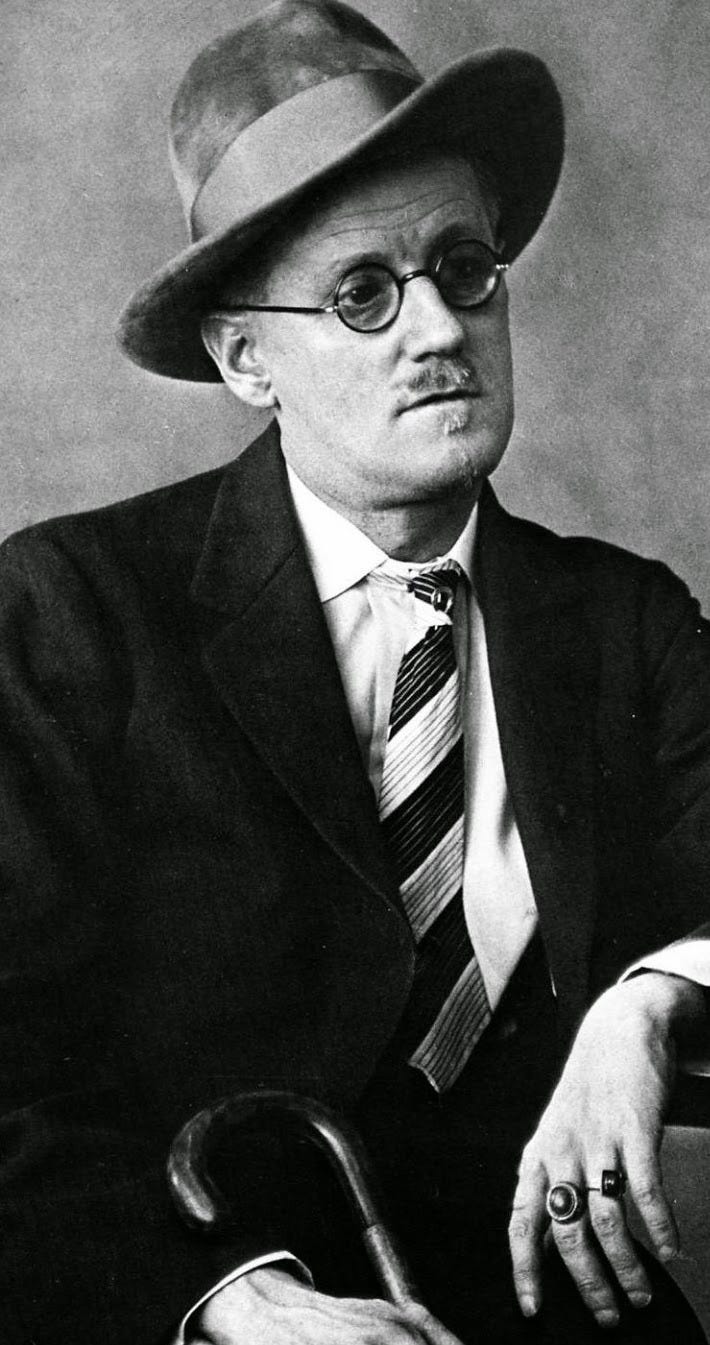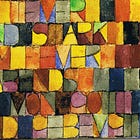Bloomsday!
Iberborealic imagination
Please subscribe to A Worlde of Wordes.
Excerpted from A Whirld of Words: A Reader’s Commonplace Dictionary.
You will find the WORKS CITED below.
Joyce, James
Joyce is a kind of a poet and also an elephantine pedant, but his real achievement has been to get the familiar onto paper. Joyce actually is more of a ‘pure artist’ than most writers. But Ulysses could not have been written by someone who was merely dabbling with word-patterns; it is the product of a special vision of life, the vision of a Catholic who has lost his faith. What Joyce is saying is ‘Here is life without God. Just look at it!’ and his technical innovations, important though they are, are there primarily to serve this purpose
(Orwell 1954) p. 218, 233
the most universal mind since Shakespeare
(Walcott and Baer 1996) p. 105
Ulysses
I hold this book to be the most important expression which the present age has found; it is a book to which we are all indebted, and from which none of us can escape
(Eliot 1975) p. 175
all the great motifs of the cultural history of Europe are contained in it, although its point of departure is a clearly established present, 16 June 1904, Dublin
(Auerbach 1968) p. 544
Molly Bloom’s soliloquy at the end of Joyce’s Ulysses ‒ the greatest piece of extended prose poetry in the English language of the twentieth century
(Alter 2019) p. 17
an urban epic
(Walcott and Baer 1996) p. 161
Ulysses is in some sense a book about literature and offers us a history of English prose style and of the novel. It is a museum containing all the quaint armor, halberds, crossbows and artillery pieces of literature. It exhibits them with a kind of amused irony and parodies and transcends them all. Ulysses is a comedy of information
(Bellow 2015) p. 123, 261
Finnegans Wake
the monstrous and splendid failure
(Barrett 1972) p. 350
triumvirate
everybody knows that the thrones of European Literature are occupied by the triumvirate referred to in Finnegans Wake as Daunty, Gouty, and Shopkeeper
(Auden 1974) p. 131
arms
these be my genteelician arms. At the crest, two young frish, etoiled, flappant, devoiled of their habiliments, vested sable, withdrewers argent. For the boss a coleopter, pondant, partifesswise, blazoned sinister, at the slough, proper. In the lower field a terce of lanciers, shaking unsheathed shafts, their arms crossed in saltire, embusked, sinople. Motto, in letters portent: Hery Crass Evohodie
(Joyce 1999) p. 546
art
to try slowly and humbly and constantly to express, to press out again, from the gross earth or what it brings forth, from sound and shape and color which are the prison gates of our soul, an image of the beauty we have come to understand
(Joyce 1964) p. 207
conscience
Agenbite of Inwit
(Joyce 1961) p. 16
Dublin
what Irish capital city (a dea o dea!) of two syllables and six letters, with a deltic origin and a nuinous end, (ah dust oh dust!) can boast of having a) the most extensive public park in the world, b) the most expensive brewing industry in the world, c) the most expansive peopling thoroughfare in the world, d) the most phillohippuc theobibbous paupulation in the world
(Joyce 1999) p. 140
emotion
the tragic emotion, in fact, is a face looking two ways, towards terror and towards pity, both of which are faces of it
(Joyce 1964) p. 205
emperor
the umproar napollyon
(Joyce 1999) p. 273
English language
I am known throughout the world wherever my good Allenglisches Angleslachsen is spoken
(Joyce 1999) p. 532
imagination
iberborealic imagination
(Joyce 1999) p. 487
infinitive
there's a split in the infinitive from to have to have been to will be
(Joyce 1999) p. 271
Ireland
the old sow that eats her farrow
(Joyce 1964) p. 203
knowledge
there is a comfortism in the knowledge that often hate on first hearing comes of love by second sight
(Joyce 1999) p. 268
language
traduced into jinglish janglage; paramilintary langdwage; lipponease longuewedge wambles; lungorge; slanguage; uval lavguage; your malherbal Magis landeguage; are we speachin d'anglas landadge or are you sprakin sea Djoytsch?; me no angly mo, me speakee Yellman's lingas; wi' that bizar tongue in yur tolkshap; languized; pigeony linguish
(Joyce 1999) p. 275, 338, 339, 378, 421, 466, 478, 485, 499, 508, 584
lausafire
since the lausafire has lost and the book of the depth is. Closed
(Joyce 1999) p. 621
law
the law of the jungerl
(Joyce 1999) p. 268
all moanday, tearsday, wailsday, thumpsday, frightday, shatterday till the fear of the Law
(Joyce 1999) p. 301
lettertrumpets
the litany of septuncial lettertrumpets honorific, highpitched, erudite, neoclassical which he so loved as patricianly to manuscribe after his name
(Joyce 1999) p. 179
literature
literature deals with the ordinary; the unusual and extraordinary belong to journalism
James Joyce (Barrett 1972) p. 140
love
love loves to love love
(Joyce 1961) p. 333
O love it is the commonknounest thing how it pashes the plutous and the paupe
(Joyce 1999) p. 269
me
to me or not to me. Satis thy quest on
(Joyce 1999) p. 269
menkind
Nebob is all menkind of every desception
(Joyce 1999) p. 270
Nietzsche
Also Spuke Zerothruster
(Joyce 1999) p. 281
now
the here, through which all future plunges to the past
(Joyce 1961) p. 186
papyr
for that (the rapt one warns) is what papyr is meed of, made of, hides and hints and misses in prints
(Joyce 1999) p. 20
qyous
coax your qyous!
(Joyce 1999) p. 472
ramble
– Were you there, eh Hehr? Were you there when they lagged um through the coombe? – Wo wo! Who who! Psalmtimes it grauws on me to ramble, ramble, ramble
(Joyce 1999) p. 506
runes
but the world, mind, is, was and will be writing its own wrunes for ever, man
(Joyce 1999) p. 19
scholarch
learned scholarch
(Joyce 1999) p. 31
soul
in a manner all that is: the form of forms – tranquility sudden, vast, candescent: form of forms
(Joyce 1961) p. 26
spondees
her spoon-me-spondees, and her dirckle-me-ondenees
(Joyce 1999) p. 139
stolentelling
the last word in stolentelling!
(Joyce 1999) p. 424
tree of the knowledge of good and evil
wind-blasted tree of the knowledge of beautiful and evil
(Joyce 1999) p. 194
verb
verb umprincipiant through the trancitive spaces! Kilt by kelt shell kithagain with kinagain
(Joyce 1999) p. 594
vicociclometer
our wholemole millwheeling vicociclometer, a tetradomational gazebocroticon
(Joyce 1999) p. 614
W
those thrown open doubleyous (of an early muddy terranean origin whether man chooses to damn them agglutinatively loo – too – blue – face – ache or illvoodawpeehole or, kants koorts, topplefouls) seated with such floprightdown determination and reminding uus ineluctably of nature at her naturalest
(Joyce 1999) p. 120
wavetrap
will you walk into my wavetrap? said the spider to the shy
(Joyce 1999) p. 287
whorled
willed without witting, whorled without aimed
(Joyce 1999) p. 272
wiseableness
the copiosity of wiseableness
(Joyce 1999) p. 472
world
our popeyed world, scribblative!
(Joyce 1999) p. 189
LINK to the Introduction to A Whirld of Words: A Reader's Commonplace Dictionary.
Please subscribe to A Worlde of Wordes.
WORKS CITED
Alter, Robert (2019), The Art of Bible Translation (Princeton, NJ: Princeton University Press) xvi, 127.
Auden, W.H. (1974), Forewords and Afterwords (New York: Vintage Books) x, 529.
Auerbach, Erich (1968), Mimesis: The Representation of Reality in Western Literature (Princeton: Princeton University Press) 563.
Barrett, William (1972), Time of Need: Forms of Imagination in the Twentieth Century (New York: Harper and Row) 401.
Bellow, Saul (2015), There Is Simply Too Much to Think About: Collected Nonfiction (Viking) xii, 532.
Eliot, T.S. (1975), Selected Prose of T.S. Eliot (New York: Harcourt Brace Jovanovich) 320.
Joyce, James (1961), Ulysses (New York: Random House) xv, 783.
--- (1964), A Portrait of the Artist as a Young Man (New York: Viking Press) 253.
--- (1999), Finnegans Wake (Penguin Books) xxxiv, 628.
Orwell, George (1954), A Collection of Essays (Garden City, NY: Doubleday) 320.
Walcott, Derek and Baer, William (1996), Conversations with Derek Walcott (Jackson: University Press of Mississippi) xv, 211.





Ah, excellent! Great quotes, I’m a big fan of Eliot’s review… not Pound so much; great poet though he was, he was wrong when he called the Homeric allusion mere “scaffolding.” :)
Why AI will never write a Ulysses. "Ulysses could not have been written by someone who was merely dabbling with word-patterns; it is the product of a special vision of life, the vision of a Catholic who has lost his faith.” George Orwell https://gallagherpdx.substack.com/p/3-bloomsday-hacks